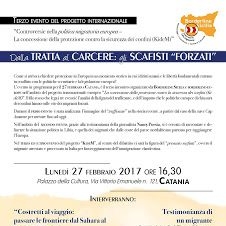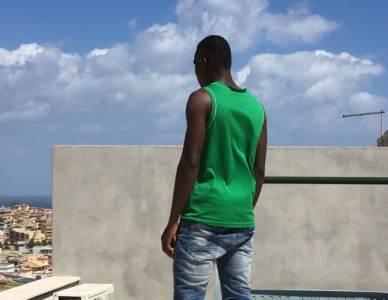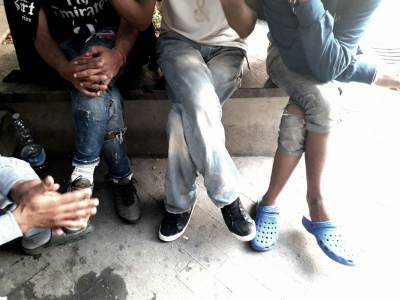A free choice which cannot be bordered
The European Commission has adopted the long awaited European
Agenda on Migration these days. Major coverage and
attention have been given to the strengthening of the mandate of FRONTEX and to
the fight against human traffickers by making available new funding schemes and
by planning joint maritime border control operations.
There have also been proposals for the transfer of
migrants among different Member States and the resettlement of those already in
the EU, with operating procedures to be reviewed until the end of May. In
reference of the “Dublin System”, a truly priority issue due the upswing in
massive arrivals, it has only been speculated a vague wish of revision, whereby
nothing came of it.
In the meantime migrants do not stop their march (quest)
for a better life. Today alone two landings affected Eastern Sicily: in
Augusta, one of the vessels of MOAS (Migrant Offshore Aid Station) in cooperation
with the team of MSF (Doctors without borders) rescued 447 refugees, while a British
vessel arrived this afternoon in the harbour of Catania with
617 people. These hundreds of men, women and children from Syria, Eritrea and
Somalia will most likely carry on their way to Northern Europe, as their fellow countrymen
and countrywomen did in the past.
Lately their getaway has received more attention from
the local media, though the visibility was still very limited and focused on
the episodes of extreme violence and exploitation. As for instance was the case
with a group of young Pakistanis, Ethiopians, Eritrean and Moroccan citizens,
who had been literally abducting fellow countrymen who were on the run and had been
asking their families huge ransoms for guaranteeing their transit to
Northern Italy.
Similarly the case of the attempted escape of a Nigerian
boy, who had bought a train ticket to Catania and been reported during a furious
argument with the ticket inspector caused by the fear of being identified.
The media propaganda restricts itself in rebuking
the European Union to its responsibilities towards the management of
migration without exposing what happens in Italy. The so called “accomodation-machinery“ structured
around a shameful state of perennial emergency, as of today turns out to be an
unorganised, confused and out of control system, where the lack of will and of
true change on the part of the institutions and most stakeholders involved is
appalling.
In the meantime the migrants reaching Italy, who do not
intend to stay in the country, linger on as the primary target of the racist
and conformist advocates of a fruitless
assistentialism. These migrants are still believed to be guilty of
carrying on their will of choosing the place where they can build their future
after having risked their lives over the seas. Guilty of refusing to remain amassed in improvised first welcome shelters and looking instead for personal protection. Guilty of
harbouring trust with the capacity of welcoming a country like Italy, which –
while denouncing human trafficking – hosts the latest arrivals in CARA-centres* in Mineo, where the existence of a
cell of human traffickers has been at the same time unveiled. Guilty of keeping
that determination in defending their right of a free choice, which we are
often short of.
In the square in front of the train station in Catania, Eritrean and Somalian
refugees who want to leave Italy have been gathering for weeks. They come from
Syracuse, after having landed in Augusta, Pozzallo, from Palermo and even from
Calabria and await the best ride. Catania turns thus to be the focal
intersection for the travels towards Northern Italy. “ For me there is no other
choice”, says D, whom I meet in Syracuse at the beginning of the month. “My
cousin lives in England and I have been forced to go through Libya and take the
maritime route to join him. I
will certainly not stop my travel here in Italy.” The same
assertion is given by the Eritrean youngsters who camp at the station in
Catania. “Nobody here wants to stay. We ask ourselves how we can go away from
here in the safest way”, tells O. on behalf of the his travel mates, who do not
speak English. “ We do not know yet whether we will be able to get a bus or a ride
by somebody. We wait.” The massive presence of migrants in the last weeks
caused the collapse to the structures for the very first aid: in the Help
Center run by Caritas, located next to the train station, the distribution of
meals is hardly enough to satisfy everybody and the same goes for the distribution of clothes and
the opportunity of using showers and restrooms. Not far away from there, in
Piazza della Repubblica, tens and tens of refugees gather and camp, among them
many women and children. Some of them hold papers with names and the telephone
numbers linked to the different Italian cities: Milan, Rome, Bologna. All
around them, as we know, a net of small and big smugglers, who are ready to ask
exorbitant sums for a ride up North. Some of them have found themselves in the
same condition few years ago and try now to perk themselves up by exploiting their fellow countrymen, who came
after them. “ We are aware that in Italy there is no place for us and we cannot
risk of staying here for years for nothing”, confides to us C. “ Many among us
have friend and relatives spread in Europe and want to join them. Anyone shall
be able to decide where to live, or am I right?” This would be the
question on which the European Commission should work but one more time it
seems that they do not have an answer.
Lucia Borghi- Borderline Sicilia
Onlus
*CARA – Centro di accoglienza per richiedenti asilo:
Hosting centre for asylum seekers
Translation: Marco Baldan



